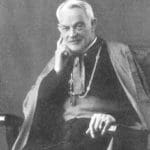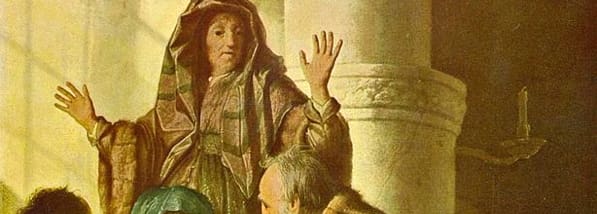THE WITNESS OF ANNA
“And there was a prophetess called Anna, the daughter of Phanuel, of the tribe of Aser: she was far advanced in years, and had lived with her husband seven years from her virginity. And she was a widow until four score and four years, who departed not from the Temple, by fastings and prayers serving day and night. Now she, at the same hour, coming in, gave praise to the Lord, and spoke of him to all that looked for the redemption of Israel. And after they had performed all things according to the law of the Lord, they returned into Galilee, to their own city Nazareth.”
Luke 2:36-39
1. “As some of the Fathers of the Church tell us, no class, age, or sex was to be left out in the homage which was to be paid to our Lord in His infancy.” Poor and rich were to be innocent children and the aged, men there, and women, those in the world and those consecrated to the service of God; and among these it is peculiarly fitting that a place should be found for a representative of that class which seems to grow with the growth of time and which is of incalculable service to God’s cause. I speak of the devoted women workers who have been conspicuous in the Church from the beginning; who followed our Lord and His apostles and ministered to them, who were specially dear to St. Paul and were constantly mentioned by Him, who shine conspicuously in the ages of martyrdom, being the protectors of the bones of martyrs and often the saviours of popes and confessors, who throughout history have been the occasion of the spread of the faith, and who to-day, by their lives, by their influence, by their prayer, by their active co-operation, are in a true sense the support of the Church.
![Simeon_RembrandtHarmensz.VanRijn[Anna]](https://spiritualdirection.com/wp-content/uploads/2014/01/Simeon_RembrandtHarmensz.VanRijnAnna-303x380.jpg) 2. A patron of this class of women is Anna; not, apparently, bound by any vow, but a widow, living in the world, devoting herself to prayer, and mortification, and the service of the altar. To such souls it is given to see more than others; in some mysterious way their knowledge of the supernatural grows from more to more; they have an instinct for the truth, and many a theologian has learnt from a word of theirs something which his study has never reached. Such souls, too, have a power in their words; without knowing it themselves their constant union with and service of God enables them to “give praise to the Lord, and to speak of Him to all that look for the redemption of Israel.” We need not then look far for the source of Anna’s discovery of the Child in Simeon’s arms.
2. A patron of this class of women is Anna; not, apparently, bound by any vow, but a widow, living in the world, devoting herself to prayer, and mortification, and the service of the altar. To such souls it is given to see more than others; in some mysterious way their knowledge of the supernatural grows from more to more; they have an instinct for the truth, and many a theologian has learnt from a word of theirs something which his study has never reached. Such souls, too, have a power in their words; without knowing it themselves their constant union with and service of God enables them to “give praise to the Lord, and to speak of Him to all that look for the redemption of Israel.” We need not then look far for the source of Anna’s discovery of the Child in Simeon’s arms.
3. All the first act had now been played. The manifestation had been made to all classes, and the Holy Family could retire with their treasure from the stage. St. Luke tells us that “after they had performed all things according to the law of the Lord they returned into Galilee, to their city Nazareth.” This raises the difficulty about the story of the Wise Men at Bethlehem, told by St. Matthew. But the difficulty should not be great. St. Luke for some reason has not chosen to tell the story over again; hence he links up his narration of the Nativity with that which is to follow, in a comprehensive sentence such as is not uncommon in the Gospels. The retiring nature of the family is what he has most in mind, and he lets that alone appear.
Summary Meditation Points
- Anna the prophetess represents the women workers in the Church, who have always been a great source of blessing.
- She represents their work and she witnesses to their reward.
- The family went back into retirement.
 Editor’s Note: This meditation is from Archbishop Alban Goodier’s “The Prince of Peace” (1913).
Editor’s Note: This meditation is from Archbishop Alban Goodier’s “The Prince of Peace” (1913).
Art: Simeon in the Temple, Rembrandt Harmensz van Rijn, 1627-1628, PD-Worldwide, Wikimedia Commons. Mirror of Archbishop Alban Goodier, S.J., www.stmaryscadoganstreet.co.uk, all rights reserved, used with permission.





